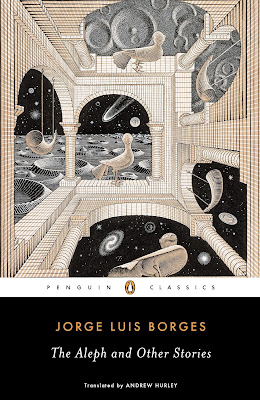About a year ago I stumbled upon this list, "The 100 Books to Read Before You Die" on Reedsy. You see, I am always tweaking my classics list, hoping to finally hit upon a nice balance of important books without just focusing on the works of old, dead, white guys. This list seemed refreshing in contrast to many others I'd seen before. Yes, there are books by the ODWGs but also works by many authors of color representing lots of different cultures. There are children's books, too, something one rarely sees on other lists. I decided right then and there to edit my classics list, adding many of the titles on this list and removing others from my mine.
In the fifth spot on the list is The Aleph and Other Stories by Jorge Luis Borges. Fifth spot? I'd never heard of the collection before. (Ha-ha! I just reviewed the list and realized it was organized alphabetically, hence the fifth spot.) I was vaguely aware of the author as I had a Borges quote on the wall of my library:
 |
| Quote by Jorge Luis Borges |
In a tribute to Borges that appeared in the New Yorker after the author's death in 1986, Mexican poet and essayist Octavio Paz wrote: "He cultivated three genres: the essay, the poem, and the short story. The division is arbitrary. His essays read like stories, his stories are poems; and his poems make us think, as though they were essays." In Review, Ambrose Gordon, Jr. similarly noted, "His essays are like poems in their almost musical development of themes, his stories are remarkably like his essays, and his poems are often little stories."
It is difficult to place all of his works into categories or genres. One critic referred to some of Borges short stories as "essayistic-fiction" while others he called "intermediate-fiction", labels which really don't help the reader at all. Borges created his own style of writing and reading his work, like any other classical author, is important for understanding literature itself.
I wish I had read the article which informed me about what type of writer Borges was before I read The Aleph and Other Stories. Honestly I found most of the stories very perplexing. The author seemed to be obsessed with death, or so I thought, as each story seemed somehow to revolve around someone's death. I was immediately aware of Borges erudition. He was clearly very well read and seemed to operate in a much higher realm than most (all?) other authors whose works I have read in my life. I also couldn't immediately tell where Borges was from since many of the stories were set in different parts of the world and encompassed different religions. I also found his works to be generally immediate and intimate. I wondered many times as I read the different stories if Borges was inserting himself in the story, or if this had really happened to him. Borges' genius was on display through this collection, that is for sure!
Borges' personal life was not what I expected. No high-life-living Fitzgerald or Hemingway here. In 1967 he married a widow, probably at the urging of his mother who was concerned that he needed someone to care for him since we was on his way to total blindness. They divorced three years later and Borges moved back in with his mother and lived with her until her death at age 99. This story really touches me. Mother's don't stop worrying about their children even when they are in their 90s. Borges referred to himself as an agnostic, but did pray the "Our Father" prayer every night because of a promise he made to his mother. Clearly he was a mama's boy! (Wikipedia)
I am pretty proud of myself for tackling The Aleph and Other Stories. Reading Borges feels like an important thing to do, like reading Kafka, Achebe, or Tolstoy. Great literature isn't always my favorite but for some reason it always seemed to stick with me.
All quotes, unless otherwise noted, were taken from the article about Jorge Luis Borges on the Poetry Foundation Website.
-Anne


No comments:
Post a Comment
I look forward to your comments and interactions! Join in the conversation.